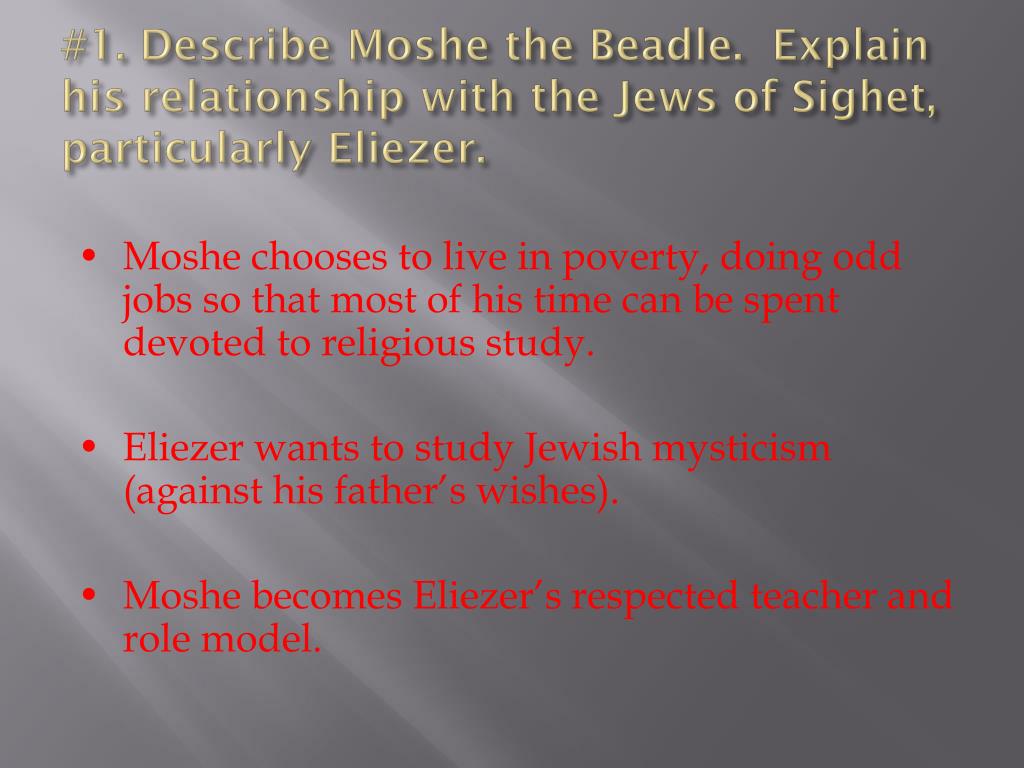Elie Wiesel's Night Study Guide 1. A-7713 'In every area of human creativity indifference is the enemy; indifference of evil is worse than evil, because it is also sterile.' ElieWiesel appears as the fourth child in the left column in this photo of child survivors of Buchenwald, a concentration camp.
Eliezer Wiesel (identification number A-7713)
- Answers to Night Study Guide 🎓questionDescribe Moshie the Beadle? AnswerWas poor, shy that made people smile, Elies mentor, made himself invisible, did not bother others, akward like a.
- If you are looking for the book Mcgraw hill companies night study guide answers in pdf form, in that case you come on to the right site. We presented full variation of this ebook in DjVu, txt, PDF, doc, ePub forms.
- Recognizing the exaggeration ways to acquire this book night by elie wiesel study guide questions and answers is additionally useful. You have remained in right site to start getting this info. Get the night by elie wiesel study guide questions and answers belong to that we present here and check out the link. You could buy lead night by elie.
- Question on the Preface and Foreword of Night. What is the central question that Elie Wiesel attempts to answer in the forward to Night? According to Elie Wiesel’s preface to Night, why did he survive?
The narrator of the book, Eliezer is taken to concentration camps in Czechoslovakia and Germany at the age of fourteen. As a young boy in Sighet, Transylvania, he is very devout and interested in Jewish mysticism, and his religious faith evolves (but is never extinguished) during his time in concentration camps. Though he is separated from his mother and sister upon first arriving at Birkenau, Eliezer manages to remain close to his father during almost the entirety of his stay in concentration camps. He is very devoted to his father, and the two share rations and look out for each other. However, the harshness of camp life weakens Eliezer's filial devotion, which causes him much shame and guilt. Eliezer becomes concerned primarily with feeding himself and with escaping Nazi brutality, and this instinct of self-preservation often outweighs concern for his father, who he expects to take care of himself. A few months before the concentration camps are liberated, Eliezer's foot swells from the cold, and he has to undergo an operation.
Eliezer's father (Chlomo Wiesel)


Eliezer's father is very respected within the Jewish community of his hometown, and he spends most of his time occupying himself with community affairs. He is a member of the Jewish Council, which is the first group to hear about deportation, and he refuses to try to escape the country. In the concentration camps, he and Eliezer take care of one another. A fifty-year-old man, he is becoming increasingly weak and dried up, and he finds it harder than Eliezer to escape the abuse of concentration camp life. On the last march to Gleiwitz, he becomes very weak and sick, and at Buchenwald he catches a deadly case of dysentery. He dies on January 29, 1945, after an SS officer shatters his skull with a truncheon. His last word is a whispered 'Eliezer.'
Moché the Beadle
A poor, humble man who works at the Hasidic synagogue in Sighet, Moché is well-liked by all the townspeople. He helps Eliezer to study the cabbala, and he teaches him that it is more important to ask God the right questions than to try to find the right answers. Early in the war, Moché is deported to Nazi concentration camps because he is a foreigner. He manages to escape and tries to warn the townspeople of the horrors of the Holocaust. They ignore him and think he's mad.
Eliezer's mother
Eliezer is separated from his mother upon arriving at Birkenau. She dies in the concentration camp.
Tzipora
Eliezer's seven-year-old sister, Tzipora and her mother are separated from Eliezer and his father upon arriving at Birkenau. She also dies in the concentration camp.
Martha
An old Gentile servant of the Wiesel family. When the Wiesels are moved into the smaller ghetto, she offers to hide the family in the country. Eliezer's father refuses to flee, and Eliezer decides to stay with the rest of his family.
Madame Schaechter
Madame Schaechter is in the same train car as Eliezer during the initial deportation to Auschwitz. She had been separated from her husband and two older sons, and she is accompanied by another younger son. She loses her mind during the journey and screams hysterically and repeatedly about a flaming furnace that she apparently sees in the distance. She terrifies the other occupants of the train, and she is repeatedly beaten by young men trying to silence her.
Dr. Mengele
The SS officer who decides who is to go to the crematories during selections. Eliezer sees him twice, once upon arrival at Birkenau and again at Buna.
Stein of Antwerp
Stein of Antwerp is the husband of Reizel, who is the niece of Eliezer's mother. He finds Eliezer and his father at Auschwitz and is desperate to hear news of his family. Eliezer lies and tells him his family is doing fine, which keeps him alive for awhile.
Juliek


A Polish violin player in the musician's block at Buna. He later reappears at Gleiwitz when Eliezer discovers that he is lying on top of him in the incredibly crowded barracks. He plays Beethoven soulfully in the night.
Franek
The Polish foreman of the musician's block at Buna. He gets Eliezer's father to work in the same block as Eliezer, but he later forces Eliezer to give him his gold crown by repeatedly beating his father.
Yossi and Tibi
Czech brothers who Eliezer befriends in the musician's block at Buna. Together they all sing Hasidic melodies, talk about Palestine, and plan to emigrate from Europe when freed.
Alphonse
A German Jew who is head of the musician's block at Buna. He is very kindly and tries to give his charges extra soup whenever he can.
Idek
The Kapo of the musician's block at Buna. He is prone to flying into violent rages at other prisoners. Eliezer catches him having sex with a young Polish girl, and Idek retaliates by having Eliezer lashed twenty-five times.
Night Preface Study Guide Answers
Akiba Drumer
A fellow prisoner at Auschwitz and Buna, Akiba Drumer is a deeply devout mystic with a beautiful baritone voice. He loses his faith at Buna and, simultaneously, his will to live. He is sent to the crematories after the selection at Buna.
Zalman
A young man who had worked with Eliezer in the warehouse at Buna. Eliezer later sees him in the run to Gleiwitz. Zalman has a stomach cramp, and when he tries to stop to go to the bathroom, he is trampled underfoot by the crowd behind him.
Night Preface Questions
Rabbi Eliahou
A very devout, pure, and well-liked rabbi who appears after the run to Gleiwitz. He is looking for his son, who had been with him for three years in the concentration camp, because they had gotten separated during the run. Eliezer realizes that the son had consciously tried to get away from his father because he no longer wanted the responsibility of looking out for another human being.
Meir Katz
A friend of Eliezer's father who worked in the garden at Buna. He is better nourished and stronger than the other prisoners because he had had access to vegetables. In the train to Buchenwald, Meir Katz saves Eliezer's life when someone tries to strangle him, but he soon loses his will to live and dies.